- Home
- Rae Carson
The Shattered Mountain Page 2
The Shattered Mountain Read online
Page 2
She steps over the body of the Invierno, trying to ignore how human it looks, and together they look down into the burning village.
The blacksmith’s stall has burned to the ground, with the attached stable soon to follow. Horses neigh in panic. Villagers scurry everywhere. Most try to flee, but volleys of arrows from the south ridge keep them penned toward the center. Papá’s huta is intact for now, but it’s only a matter of time before the roof catches.
Her breath hitches. The dry wash behind their huta! It’s overgrown, invisible to outsiders. It hasn’t caught fire yet, and she doesn’t see any arrows coming from the ridge above it.
Her people could use it to escape, if someone showed them the way.
“Do you see Adán?” Julio says, panic edging his voice.
“Maybe he got away.” The lie feels heavy on her tongue.
Julio starts forward. “I have to find—”
Mara grabs his arm. “Look. The east ridge.” She points to the tall figure silhouetted against the sky—one of the dreaded animagi. Wind whips his robes taut against his gaunt body and sends his eerie white hair streaming behind him.
He lifts his hand. Something dangles from it, something that shimmers in the morning light. A white-hot firebolt spews from the shimmering thing and explodes against a nearby rooftop. The roof collapses, shooting flames and smoke into the sky.
Mara lurches back, her heel skidding in gravel, as Julio whispers, “Oh, my God.”
Her heart hammers with fear and rage. “If I were a little closer, I could shoot him.”
“If you miss your first shot, you’re dead. I can try with my sling.”
“A sling is even more useless long range!”
“We have to do something.”
Julio pulls her down, out of sight, and Mara is struck breathless by how stupid they were to stand there gaping, right out in the open.
“No one will get out of the village unless the Inviernos are distracted,” Julio says.
“The gully behind my father’s huta is still clear, but probably not for long. If you . . .” She swallows hard against what she is about to suggest. “If you distract them, attack the animagus from behind, I can get them out. I can show them the way.”
“It’s not just the animagus we have to worry about!”
“It’s smoky, and most of the archers are concentrated on the south ridge.” She reaches up and cups his cheek. “I’ll find your little brother.”
The knob of his throat bobs as he swallows. “I’ll just have to make a big enough distraction.”
“We’ll meet afterward.”
“Where?”
“The meadow. No, wait.” They would be going from one sheep pen into another. “The cave. Where we first . . .” Tears prick at her eyes. Where they first made love.
He’s shaking his head. “That’s halfway up the Shattermount!”
“It’s safe. Invisible from the outside. We could see anyone coming.”
Something crashes below. Smoke billows into the sky.
“Julio, there’s no more time! We have to—”
He takes her face in his hands, kisses her once, hard. “I love you, Mara.” And he melts into the brush.
4
MARA slips down the gravelly slope. The manzanita tears at her skin and clothes, but it also hides her descent. The smoke is thicker here. Not much time before she won’t be able to breathe.
She lands on the valley floor between the stables and the tanner’s huta and pauses. Adán first, because she promised. Then Papá.
Mara creeps down the alley until she reaches the front of the buildings. Before she can think, before she can be afraid, she bursts from cover and sprints across the plaza, past the stone well, into the market. An arrow zings by her ear, but she keeps pumping arms and legs as fast as she can. She scoots behind a burning market stall. It won’t provide a real barrier, but the smoke and flames might make her hard to spot from the ridge.
Gasping for breath, she peers through the gloom. There must be survivors . There must be.
Movement, just to her left. A shape materializes. “Mara!”
“Reynaldo!” A boy from one of the surrounding farmsteads. She has never been so glad to see anyone in her life. Ash-gray tears streak the boy’s face.
”Have you seen Adán?”
The market stall behind her collapses on itself. She darts forward, into the cover of smoke, grabbing the boy’s arm. Her lungs sting and grit fills her eyes.
“This way,” he says, but the smoke is too much. The hutas are thickest here, and all of them burn. She pulls him to the ground, where the air is a little clearer, and together they crawl forward through an alley.
More shapes ahead. Children. Huddled on the ground, clutching one another in the lee of the cliff wall. Out of range and sight of the Inviernos, but they will burn soon enough. If they don’t suffocate first.
Mara scrambles toward them. There are five, all different ages, and she almost sobs with relief to see Adán. He and Reynaldo are the oldest, almost young men. Adán holds the littlest in his lap, a tiny girl of three or four.
“I know how to escape,” Mara says without preamble. “There’s a gully behind my papá’s house. We can use it to sneak out.”
Adán hitches the little girl to his chest. “They’ll shoot us!” he says.
“Better than burning alive,” Reynaldo counters.
Mara meets Adán’s gaze. “Julio is providing a distraction. We’ll go carefully, try to stay out of sight, but we have to do it now.”
The children exchange terrified glances. “Now!” Mara yells. “On your feet or I will thrash you!” She’s not above threats if it means saving lives.
They all jump to their feet.
“Crouch low to avoid smoke. Put up your shirts, like this.” She lifts the collar of her blouse over her mouth and nose, and they copy her, eyes wide with hope and fear. “Follow close, and don’t look back. Reynaldo, can you take up the rear? Make sure no one straggles.”
They set off, and Mara moves as fast as she dares. She keeps between the back walls of the hutas and the looming cliff face. It provides the best cover from shooters on the ridge, but the smoke huddles here, and within moments most of the children are coughing.
A smoking pile of rubble marks the end of the hutas, and Adán lets a small sob escape. It’s Julio’s family home.
Mara grabs the hand of the nearest child, to absorb comfort as much as to give it, and says to them all, “We wait for a break in the arrows, then we run, as fast as we can, to my father’s house. Understood?”
Their sooty faces bob up and down.
“Reynaldo, are you strong enough to carry the little one?” She’d do it herself, but she might need her hands free for her bow.
“I . . . yes.”
“Good. Wait for my signal.” She peers out of the smoke, into the clearer plaza. Large blackened lumps pepper the paver stones. They steam and smoke, and bright red peeks through cracks in their charred surfaces. Maybe, with all the smoke and the chaos, the children won’t recognize them for bodies.
Arrows rain down toward the smithy. Is someone trapped there?
Shouts sound from the ridge, and the arrows cease to fall. Thank you, Julio.
“Now!” she shouts, and the children burst from cover into the plaza. Adán leads, and Mara yearns to sprint after him, but she takes up the rear, yelling, “Go, go, go, almost there!”
Her father’s huta is in decent shape compared to the others; only the back wall burns. But that means the fire will soon spread to the gully.
Mara guides them around it to the gravelly slope. “Everyone, into the ditch. It’s steep—grab the bushes as you slide down . . . that’s it.”
The tiny girl is the last of the children to go down. Mara lifts her and lowers her into Reynaldo’s waiting arms.
“Keep your heads down,” Mara orders. “Follow the gully until you reach the stand of cottonwoods. Hide there. If the Inviernos come, run. If I’m not ba
ck by the time the sun touches the earth, run.”
“You’re not coming?” Adán says, his voice coarse with coughing.
“I need to find my pá. And any other survivors. I’ll be back as soon as I can.”
“Maybe you can find my sister,” a boy says.
“And Mamá,” says a girl of about ten. “She made me go, and then the roof . . .”
“Muffin, my goat,” says the tiny girl.
Oh, God. She can’t possibly save them all. “I’ll do my best,” Mara says. “Now go! Be brave, be smart. Reynaldo is in charge until I get back.” And she steps away before she can change her mind or hear any more about lost loved ones.
Mara enters Papá’s huta. Smoke fills the common room; she can barely see an arm’s length in front of her. “Papá? Are you here?” A dagger of guilt twists in her chest. If he’s dead, it’s her fault. “Papá?”
She shuffles around blindly, feeling with feet and hands. Her shins knock the table, and she works around it, searching for a body. She doubles over with coughing. Her lungs are on fire, and dizziness wavers her vision. She drops to the floor and breathes deep of the clearer air before moving forward on hands and knees.
Mara finds the settee that her father loves to offer to guests, the prayer table where he burns candles to God, the shelf where he keeps his manuscripts. She does a complete circle of the room, ending up at the kitchen area—but there is no sign of Papá.
At the edge of the hearth is her father’s travel bag, the one he uses when he leaves the village to do God’s work.
Supplies. They left Julio’s pack in the meadow, but they’ll need something to get them to the next village.
It is a good thing she has practiced sneaking out during so many dark mornings, because she can find everything she needs, even sightless. She grabs the tinderbox, her favorite skinning knife, a cooking pot, a round of cheese, a package of deer jerky, last night’s bread loaf, a small pot of honey, a half-empty flour sack, an extra quiver of precious arrows.
Her father’s bag barely holds everything. Despair almost consumes her right then. She has enough to feed five children for only a day. Two if they ration. But the nearest village is almost a week away.
Maybe they can supplement their food on the way. She’ll assign the littlest ones to watch out for certain plants as they go. They’ll make it somehow, even though Mara is not a very good hunter.
Papá presented the bow to her as a Deliverance Day gift, as a show of wealth more than anything. See? My daughter doesn’t use a sling like the rest of you. Only a pine bow will do. She took it up only because it was an efficient way to scare predators from her sheep, not because she expected to hunt regularly.
The sheep! Her sweet, stupid sheep. Abandoned in the meadow without a moment’s hesitation.
She slips the bag’s strap over her shoulder. “Papá? Where are you? We need to—”
Something crashes into her back, knocking her to the floor. A huge weight pins her down, and she fights to breathe.
“You wicked girl!” her father rages. A fist crashes into her shoulder blade. “You brought this down upon us! With your sin. And now you steal from me? Before leaving me to die?”
She squirms out from beneath him, but he catches her ankle. “No, Pá! I came back to find you. I was worried—”
He reaches for her face, misses, grabs a chunk of hair instead, ripping it from her scalp.
Blackness edges her vision. She knows what will happen next. Her mind will go away. To a place where there is no pain, where she can watch, detached, as he pummels her.
Not this time. The children need her. She claws her way back from the edge of consciousness, to where grit from the floor grinds into her raw, damaged scalp and unrelenting fingers dig into her lower leg. She tries to yank her ankle away, but his grip is firm.
Terror builds inside her, becomes fury, becomes strength. She channels it all into a single, tremendous kick to Papá’s face.
He releases her ankle.
She scrambles back toward him. “Pá? Papá?” She shakes his limp body. “We have to go! Please . . .”
Blood oozes from his nose, soaks his beard. Did she kill him? She reaches for his neck to check his pulse, but the back wall of the huta collapses. Sparks shoot into the gully where the children are fleeing.
Mara grabs the travel bag and darts outside, leaving her father behind.
5
SHE pauses at the edge, about to plunge into the gully, but movement catches her eye. There, by the smithy. A dark shape in the smoke.
Mara can’t tell if it’s a person or a horse, but either one is worth the risk. She dashes toward it. Arrows rain down around her, and her greatest fear roils in her heart like a black cloud. If the Inviernos are shooting again, it means Julio no longer distracts them.
She plunges into the cover of smoke, choking and coughing. “Hello!” she calls. “Anyone here?”
“Here,” comes a tiny voice.
She drops to her knees and crawls toward it. It’s Carella, the smith’s wife. She huddles against the stall, clutching her small daughter in her lap.
“Barto is dead,” the woman moans. “Dead, dead, dead.”
Mara should feel sympathy, but all she can muster is panic. “On your feet, woman! Or your child dies too.”
Carella blinks up at her. Tears streak her ash-dusted face.
“There’s a group of survivors waiting for us,” Mara says. “We’re making a run to the next village.”
Carella whimpers, clutching tighter to her daughter.
Mara slaps the woman across the face, but then she chokes out a sob, shocked at herself.
But Carella is getting to her feet. “Which way?” she says wearily, then doubles over with coughing.
“Let me,” Mara says, grabbing the child from Carella’s arms. The girl is about five or six, too big to carry easily, but her mother’s movements are slow and staggered, as if she’s badly injured. Or maybe she has breathed too much smoke.
Carella steps from the cover of the smithy into the plaza.
“Wait!” Mara calls. “This way; we must stick to cover.”
Carella looks over her shoulder. “Take her. Keep her safe.” She hobbles forward, into the light, clear air, revealing the blood soaking the back of her skirt, streaming down her right ankle. She reaches her arms to the sky as if summoning heaven itself. “Go, Mara! Now!”
Mara freezes.
A firebolt streams through the sky and plunges into Carella’s torso. She stumbles but does not fall, even as her blouse and hair catch flame, turning her into a fiery goddess. “Go!” she screams.
A second firebolt sends her crashing to the ground.
Mara hitches the child tight to her chest and flees.
6
THE children are waiting right where she told them to. The tiniest girl’s chin and blouse are soaked with red-tinged phlegm. At Mara’s questioning look, Reynaldo says, “She’s been coughing up blood.”
Oh, God. If she has internal injuries, there is nothing they can do.
Reynaldo’s eyes flash when he notices Mara’s patchy hair and her bruised eye—her bruised eye . . . when did that happen?—but his gaze slides over it like water, a veil clouds his face, and her injuries are suddenly invisible to him. She’s seen it happen dozens of times before. The villagers always turned a blind eye to this, the handiwork of her father.
“We need to get away,” Mara says. She doesn’t want to scare the children more than necessary, but she can’t bring herself to lie either. “The gully behind me is starting to catch fire, and the Inviernos could have scouts in the area. So we move fast and quietly. There will be no talking unless it’s to call out a warning. Understood?”
They nod in unison.
“What about my brother?” Adán asks. “Did you see Julio?”
“He’ll meet us on the Shattermount.”
As they exchange fearful glances and murmur among themselves, Mara considers that lying might have been bet
ter after all.
“Mamá says I’m not allowed on the Shattermount,” says one little girl.
The boy beside her nods solemnly. “There are bears.”
“Flash floods!” says Adán.
Mara sighs, knowing there is no safe way to lead them. “Yes, there might be bears. And flash floods. And even ghosts,” she says. “But do you know what the Shattermount doesn’t have?”
The children shake their heads.
“It doesn’t have Inviernos. It’s too frightening a place for them. Only Joyans are brave enough for the Shattermount.”
“I’m not afraid,” says Adán. A chorus of “Me neither” follows.
Thank you, Adán.
“Will we climb the slope or stick to the fault?” Reynaldo asks.
“The fault. It’s out of sight.” Julio’s family maintained a trap line on the Shattermount, as did a few other villagers. No one has seen signs of Inviernos there. Yet. But it’s better to be cautious. No one had seen them in the village either, before this morning. “We’ll keep an eye on the sky.” Rain, even a day’s journey away, could mean a flash flood.
Reynaldo nods agreement, and she suddenly wants to hug his gangly form, just for being almost grown up, someone who can help make decisions and look out for the little ones.
They set off, quietly as promised. They walk for hours, and Mara’s thighs burn with effort, for the Shattermount is a steep, wide-based monolith that marks the transition from desert foothills to the mighty slopes of the Sierra Sangre. In its upper reaches, the desert scrub gives way to pine, the gravel to granite, the rain to snow. A thousand years ago, or maybe more, a great cataclysm opened a huge fault line right down the center. This shattering resulted in a mountain with a deep groove and twin peaks. Julio always compared them to the horns of a mighty goat. Mara preferred to think of them as the ears of a great lynx.
The sun is low at their backs, sweat is stinging Mara’s ruined scalp, and a few of the children are beginning to stumble from exhaustion when they walk right into a campsite.
The children rush forward, recognizing a few friends. Four more survivors—three children and one badly injured adult. Two horses. A pack full of supplies. A cheery fire sending smoke tendrils into the sky.

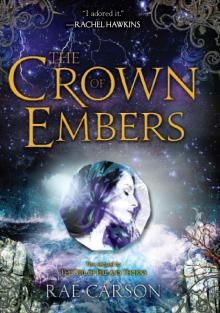 The Crown of Embers
The Crown of Embers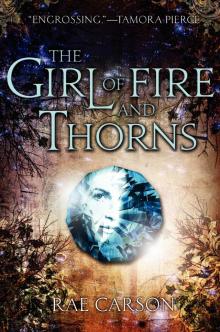 The Girl of Fire and Thorns
The Girl of Fire and Thorns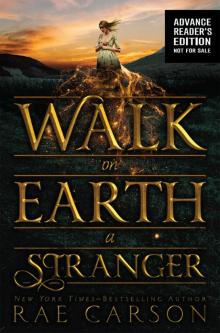 Walk on Earth a Stranger
Walk on Earth a Stranger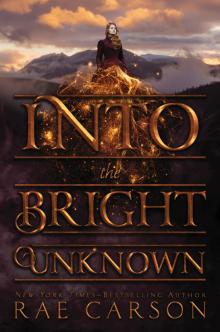 Into the Bright Unknown
Into the Bright Unknown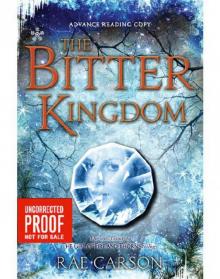 The Bitter Kingdom
The Bitter Kingdom The Rise of Skywalker
The Rise of Skywalker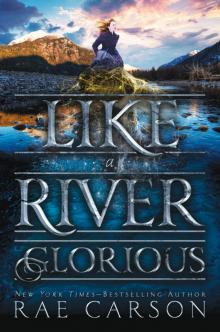 Like a River Glorious
Like a River Glorious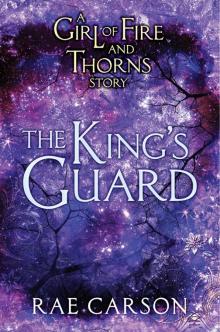 The King's Guard
The King's Guard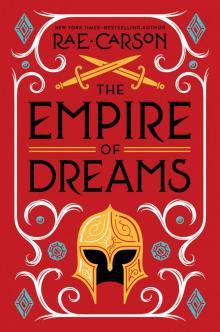 The Empire of Dreams
The Empire of Dreams Most Wanted
Most Wanted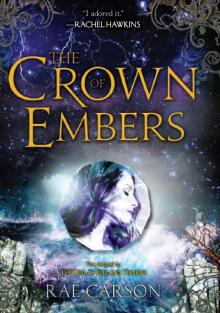 The Crown of Embers fat-2
The Crown of Embers fat-2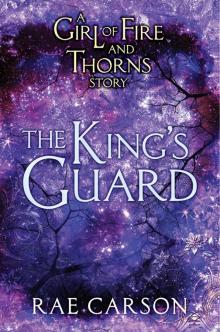 The King's Guard (fire and thorns)
The King's Guard (fire and thorns)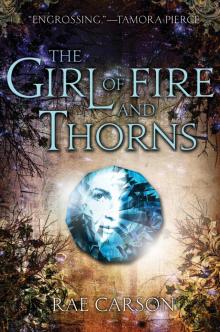 The Girl of Fire and Thorns fat-1
The Girl of Fire and Thorns fat-1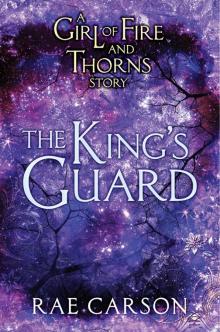 Fire and Thorns 00.7: King's Guard
Fire and Thorns 00.7: King's Guard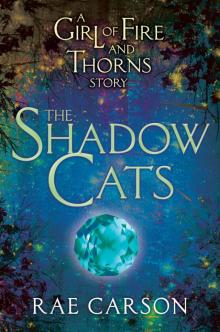 The Shadow Cats (fire and thorns )
The Shadow Cats (fire and thorns )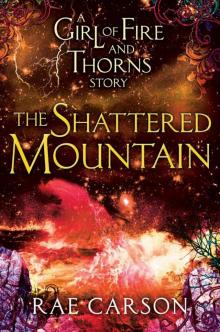 The Shattered Mountain (fire and thorns)
The Shattered Mountain (fire and thorns)